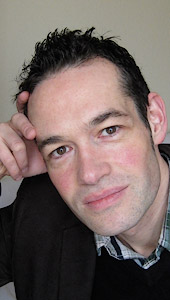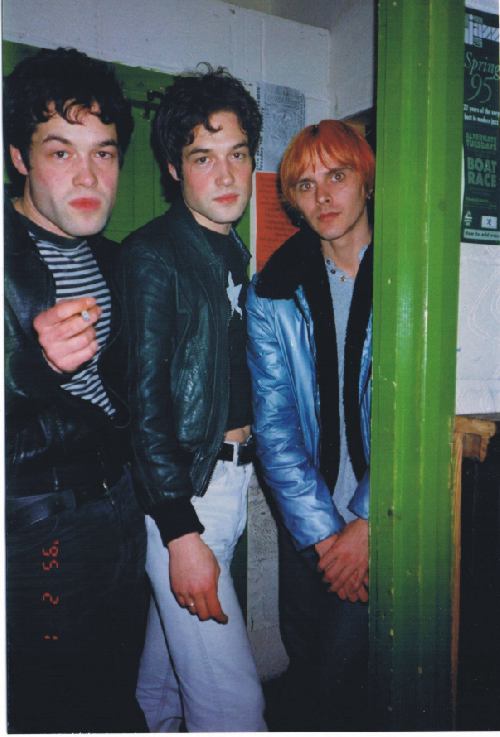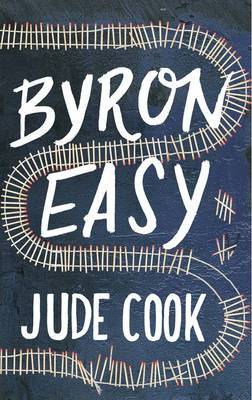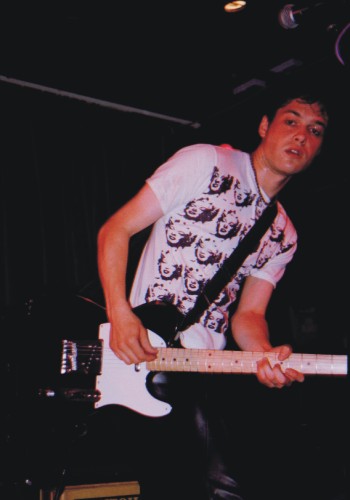
|
Jude Cook
The first out of town band R*E*P*E*A*T ever interviewed were Flamingoes (on 2nd February 1995). And so it seems somehow apt and symmetrical that the first proper novel we've ever been sent to review is by former Flamingoes front man, Jude Cook, whose debut book Byron Easy has kept Rosey entranced and entertained and thinking for the past 6 weeks. A sprawling introspective comic train track into the loves and losses of a fin de siècle struggling artist, the plot is a triumph of storytelling, daring and exuberance over banal conformity. Given all this, we thought it was time to catch up
with Jude and ask him some more questions...
|
Lucy: Your band have been quite quiet for the last few months. Are you looking forward to playing gigs again?
Katie Jane Garside: I think I give very obtuse ans
| I've really enjoyed Byron Easy, I found it original
and entertaining and very well written - what has the reaction to it been
like?
Thank you. The reaction has been uniformly good, not just from reviewers, but from friends and family (the very people I was afraid would read it). I don't think Flamingoes ever had a terrible review either, except for a couple of live gigs - but they might have been deserved. When you think back to how vicious and partisan some corners of the music press were at the time, it's a minor miracle. Byron quotes and alludes to a lot of writers in the novel, how much do you and he share inspirations? Part of Byron's manic alluding is the show-off tendency all autodidacts have. I of course share all of his inspirations . . . Byron Easy, c'est moi. I recall Hall or Nothing encouraging Flamingoes to write our own press releases, quoting all the inspirations for the songs and the band's raison d'etre, manifesto-style - this was after they had such a success asking the Manics to do the same. After all, a band knows its reference points, and this saved journos reaching for the usual lazy suspects. I've sometimes found it hard to tell which voices are yours and which are Byron's; is this deliberate? Is Byron partly you? See above . . . yes, but it's more complicated, as it always is with first-person novels. The danger is to always conflate the 'I' persona with author. Byron's voice is not my voice, but an amped-up version of it. Plus it takes from other sources - the address to the reader comes largely from 18th-century fiction; the garrulous, mocking tone from any number of contemporary novels. And of course, there is the voice of the actual Lord B, from his poems and letters, which seeps in somehow. I wondered if by the end of the novel Byron had managed to shake off some of his more plastic posing and walked towards reality and out of cliché; would you agree? Yes, he sees the light, literally and metaphorically. He would probably drop the posturing if he wrote his post-Christmas memoirs.
500 pages is pretty impressive for a début novel, how long did it take to write and how did you afford to do it? You're the first person to ask 'how did you afford to do it', and I think it's a cogent question, especially now when the publishing business seems to be in a constant state of flux. On a wing and prayer is the answer. The book took five years to write during which I was doing a number of different things to subsidise the writing: working as a recording engineer, being a guitar-for-hire in different bands, and latterly teaching English Lit as a private tutor. Somehow, the book took shape. I think an author can do this once, but not over a whole career. Perhaps this is something that just afflicts writers of literary fiction - the genre writers sell better, and so get a less bumpy ride. The fact that Adam Foulds - Booker shortlisted author, one of Granta's 20 best writers under 40 - had to drive a fork-lift while penning his books says it all . . .
They're surprisingly similar. In songs you are dealing with distilled emotions, and often character. Waterloo Sunset is a great example of a novel in a song. You told us in our 1995 interview that Suicide Bridge (inspired by the death of a friend) was your favourite song on the Plastic Jewels album - would you agree that some of the same issues are dealt with in the novel? Definitely. I remember telling my editor Tom Avery that Plastic Jewels was the primal scream version of Byron Easy. Listening to it now, I can see how all those themes of existential angst, suicide, and doomed love were explored in a feral, youthful fashion. Have you read Dylan Thomas' 'Return Journey' as I feel it carries some similarities with your book in the way it treats the revisiting of childhood haunts? I have read it, and love it - I think it was intended as a radio play. Thomas is rarely discussed as a short story writer, but he was matchless, especially on childhood. There are refs to 'Fern Hill' in the 'Home' section of Byron Easy, and there was definitely a deliberate attempt on my part to go back and inhabit a character's childhood for a whole chapter. The danger is this takes one out of the present-day narrative, but nobody has said it has this effect so far. Richey Manic and Kurt Cobain are definitely present in the novel, have they continued to be present in your life (as in mine)? Very much so. Especially with Richey. As time goes on, it all becomes more poignant. Like Kurt, he will be forever young. Looking at pictures of him takes one back to one's youth instantly. We met Richey a couple of times, backstage at gigs in Cardiff and elsewhere, and he was a very shy, softly-spoken presence. One of the great intellects of rock, too . . . And it was nice to hear from another source that he was Flamingoes fan. There is a great film to be made of his life (the books, apart from Simon Price's biography, haven't been equal to him). I have a title for a possible movie: 'Missing, Presumed Beautiful.'
The sleeve art work is fantastic, how did it come about? If you mean for Byron Easy, I agree. The designer, Glenn O' Neill, came up with something really special. Like all artwork, it proceeded slowly and associatively, with early ideas being rejected as too literal. The railtrack was always going to be there - but having matches as sleepers was the breakthrough. He also came up with that textured, purple background (actually a blackboard) which reminds me of early 4AD sleeves. Flamingoes always put a lot into the album artwork. Apart from the obvious references to small-town suburban life and childhood, nobody picked up on the fact that the boy on Plastic Jewels is standing on one leg, like a Flamingo . . . How have you found the difference in the creative process between working alone on a novel and collaborating in a band? Collaborating on songwriting certainly helped with the editorial process - which became really creative in the end. Without that experience, I might not have been so open to ideas and suggestions of revision. In the end, I got the book I wanted, and I hope Tom did too. Having said that, by and large, the writing of fiction is a long, lonely dirt road, full of insecurity and mental and financial breakdown. It's a wonder that everyone seems to want to do it. Byron is obviously well messed up by his family history and childhood experiences; how much of an influence on our lives are Violent Fathers, Absent Sons? A pervading influence, I think. In a Freudian sense, you can't escape the early scars. The past stress equals the present weakness. In some ways, the writing of songs like Absent Fathers for Flamingoes was the breakthrough the band needed to find a voice. Write about the most important or damaging things in your life and you can't go wrong. That will carry you through singing those lyrics on stage five thousand times. No more love songs. Is the character Mandy inspired by any of the same people that inspired the song Scenester? Mandy wasn't inspired by any particular Scenester, but at the time you couldn't move for people who wanted to form bands, but hadn't put in the necessary work - or thinking. I stress the latter, as the punk ethic of having three chords and a good idea was still weirdly active at the time. Most of the scenesters didn't have a clue - they just wanted to go to the next Bluetones party. What do you wish you'd known about the creative process when we interviewed you at Cambridge Boat Race in February 1995 that you now know? That you will achieve better work if you live long enough - and also that you need a good superstructure around you to develop. And that you can't rush art.
Did you achieve what you wanted with The Flamingoes? With the two albums, maybe. But never on stage ... It would be great to do another album one day, but writing fiction is the main gig now. Having said that, you never become an 'ex' or former musician. I still have to pick up a guitar every day, even just to hold it. What's next for Jude Cook? Another novel and some short stories. Not sure in what order. What's best, chips or cream buns? Cream buns. https://www.facebook.com/pages/Jude-Cook/407371492674205 A review of Byron Easy should appear on this site soon! Thanks to Jude for his time and for still remembering us 18 years later, to Emma at Random House for fixing up the interview and of course to the ever incredible Caffy St Luce for sending us the CD and sorting out the interview all those years ago... |
script, maybe we are looeir m



